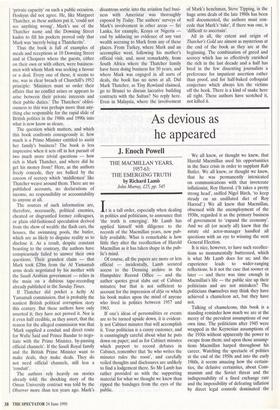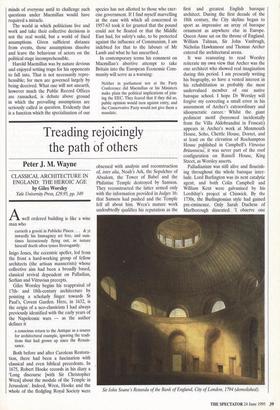As devious as he appeared
J. Enoch Powell
THE MACMILLAN YEARS, 1957-63: THE EMERGING TRUTH by Richard Lamb John Murray, £25, pp. 545 It is a tall order, especially when dealing in politics and politicians, to announce that `the truth is emerging'. Mr Lamb has applied himself with diligence to the records of the Macmillan years, now pub- licly available. What is remarkable is how little they alter the recollection of Harold Macmillan as it has taken shape in the pub- lic's mind.
Of course, all the papers are more or less official — incidentally, Lamb secured access to the Denning archive in the Hampshire Record Office — and the author quotes great slabs out of Cabinet minutes; but that is not sufficient to account for the impression of deja vu which his book makes upon the mind of anyone who lived in politics between 1957 and 1963.
If one's ideas of personalities or events are to be turned upside down, it is evident- ly not Cabinet minutes that will accomplish it. Your politician is a canny customer, and is cunningingly careful about what he puts down on paper; and as for Cabinet minutes which purport to record debates in Cabinet, remember that 'he who writes the minutes rules the roost', and carefully veiled thoughts and disclosures are unlikely to find a lodgement there. So Mr Lamb has rather provided us with the supporting material for what we thought we knew than ripped the bandages from the eyes of the public. We all knew, or thought we knew, that Harold Macmillan used his opportunities in the Suez crisis in order to supplant Rab Butler. We all knew, or thought we knew, that he was permanently intoxicated on communications with that inveterate inflationist, Roy Harrod. (`It takes a pretty strong head', sniffed Nigel Birch, 'to keep steady on an undiluted diet of Roy Harrod'.) We all knew that Macmillan, obsessed with the unemployment of the 1930s, regarded it as the primary business of government to 'expand the economy'. And we all (or nearly all) knew that the astute old actor-manager handled all questions with an eye to winning the next General Election.
It is nice, however, to have such recollec- tions so monumentally buttressed, which is what Mr Lamb does for us; and the experience leads to wider-ranging reflections. Is it not the case that sooner or later — and there was time enough in Macmillan's life — the public size up their politicians and are not mistaken? The politicians themselves may think they have achieved a chameleon act, but they have not.
Talking of chameleons, this book is a standing reminder how much we are at the mercy of the prevalent assumptions of our own time. The politicians after 1945 were wrapped in the Keynesian assumptions of the 1930s without apparently the power to escape from them; and upon those assump- tions Macmillan harped throughout his career. Watching the spectacle of politics at the end of the 1950s and into the early 1960s, it seems amazing how the certain- ties, the delusive certainties, about Com- munism and the Soviet threat and the indispensability of a fixed exchange rate and the impossibility of defeating inflation by direct legal controls dominated the minds of everyone until to challenge such questions under Macmillan would have required a miracle.
The world in which politicians live and work and take their collective decisions is not the real world, but a world of fixed assumptions. Given sufficient distance from events, those assumptions dissolve and leave the behaviour of actors on the political stage incomprehensible.
Harold Macmillan was by nature devious and enjoyed setting traps for his opponents to fall into. That is not necessarily repre- hensible; for men are governed largely by being deceived. What one will not unearth, however much the Public Record Offices are ransacked, is debate above ground in which the prevailing assumptions are seriously called in question. Evidently that is a function which the specialisation of our species has not allotted to those who exer- cise government. If I find myself marvelling at the ease with which all concerned in 1957-63 took it for granted that the pound could not be floated or that the Middle East had, for safety's sake, to be protected against the influence of Communism, I am indebted for that to the labours of Mr Lamb and what he has unearthed.
In contemporary terms his comment on Macmillan's abortive attempt to take Britain into the European Economic Com- munity will serve as a warning:
Neither in parliament nor at the Party Conference did Macmillan or his Ministers make plain the political implications of join- ing the EEC. They feared that if they did so, public opinion would turn against entry, and the Conservative Party would not give them a mandate.



























































 Previous page
Previous page